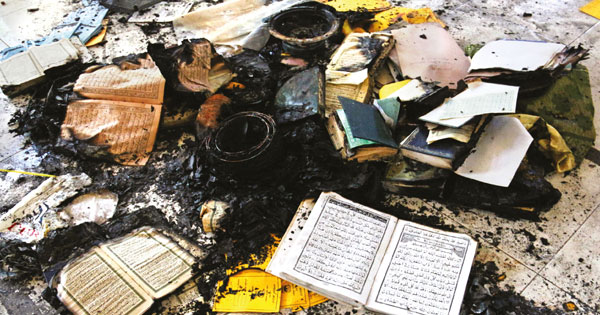STATE OF THE NATION
THE GRIM DESTINY OF A SMALL ISLAND
Wijith DeChickera rues the strategies of global powers who sow the fertile seedbed of religious fundamentalism
If June would be the ‘month of brides,’ 2019 was supposed to be one long honeymoon for Sri Lanka. Named Lonely Planet’s place to be this year, the world’s No. 1 tourist destination became a nightmarish landscape… overnight.
Not holiday fun but forensic horrors are being visited on us and it hurts that the fruit of almost 10 years of peace has spoiled in one bloody day and its gangrenous aftermath. What hurts most – adding insult to injury – is that those to whom we might turn for help may well mean us harm.
It is a public secret that global powers have had their eyes on our island in the sun for a while. Ever since a spate of developments in our country put Sri Lanka on the world map again, crafty eyes have been spying on us.
These would have seen the end of a protracted acrimonious war, sowing of fertile seedbeds with violent weeds of chauvinist nationalisms and sectarian tensions, and the rise of homegrown opportunities to reap the whirlwind of a full-blown cataclysm.
To be more specific, the end of a 26 year civil war robbed local and international arms dealers of their macabre source of filthy lucre. The clash of civilisations of which Sinhalese-Buddhist extremism was a harbinger was exacerbated by a fundamentalist Islamist uprising. And the apparent entanglement of ISIS’ deadly dream of a worldwide caliphate in Sri Lanka’s destiny opened the door to stronger securitisation of our region.
In all of this, it is clear to my mind that it’s not us islanders who benefit. No matter how sorry our northern neighbours may sound after the event or how sincere our friends worldwide may seem on the way forward, it is their sordid and strategic interests that are best served by sundry agencies and instrumentalities.
Sri Lanka was saved from internecine warfare only to be inveigled into a warped international agenda. The fact that fanatical religion is a convenient foil for cold calculating globalist ambitions is no longer a faddish conspiracy theory but a cynical reality.
To wit: India manages its domestic affairs better when its southern neighbour is in a state of crisis. To this, its formula of old, add the frustrating element of China’s entry and ascendancy in the region, which is India’s traditional domain and an entrepot for Western imperialist aspirations – to control ancient oriental maritime trade and commerce, which is staggering in its projected trajectory of growth over the next two decades or so and more.
Being strategically located at these crossroads is a blessing to outsiders but the bane of the island’s inhabitants.
No little interest has been expressed in this locational goldmine of an isle. At one time in the not too distant past – at the cessation of hostilities in 2009 – it was reliably learned that the intelligence agencies of no less than six foreign powers were in the field in Sri Lanka’s eastern seaboard.
Even at that time, a poten-tial hotbed of Saudi funded Wahhabism loomed, and has flowered into the explosive Salafism we witness today. A curious schoolboy may as well rattle off the names of CIA, MI6, RAW, KGB, Mossad and Chinese security services.
To counter such raw (no pun intended) espionage could be challenging. But to contain the deadly agency of operatives inimical to our national security would require political subtlety and a superlative native intelligence network.
Sadly for Sri Lanka, while our security services may have rendered more than yeoman service, political wit has left a lot to be desired. That is not surprising when our national leadership is torn between a set of opportunistic half-wits on one crooked hand and a half-witted bunch of orchestrators of corrupt power bids on the other.
In such a twisted milieu, the needs of the hour are manifold if Sri Lanka is to be saved from a fate similar to that which befell Afghanistan, Iran or Iraq, or even Syria or South Sudan.
First, we must seek shepher-ds who are not of the present twisted ilk who feed on the fears of their gullible and troubled fold.
Then we need crooked philosophies and perverted religions to take a backseat so that the faith of us in ourselves and our national character under duress – amity, brotherhood and sisterly sympathy, and cordial hospitality to strangers and those in need of food, rest and shelter – can be restored.
And last but not least, we need good people to stand up, speak up and then shut up before they get too carried away by their own rhetoric.
I am not sanguine about the prospect that we can develop anything like a national panacea for our own ills. Nothing succeeds like professional or academic apathy and businesslike ignorance, alleviated by the occasional social media rant to sate our ire, salve our conscience, or satiate the bigot in all of us.
There are many ways in which we deceive ourselves, not least of which is that we have all failed to safeguard our hard-won peace. Just don’t blame it all on those past masters of duplicity, our political servants and their ostensible partners in progress – the powers over the sea.




